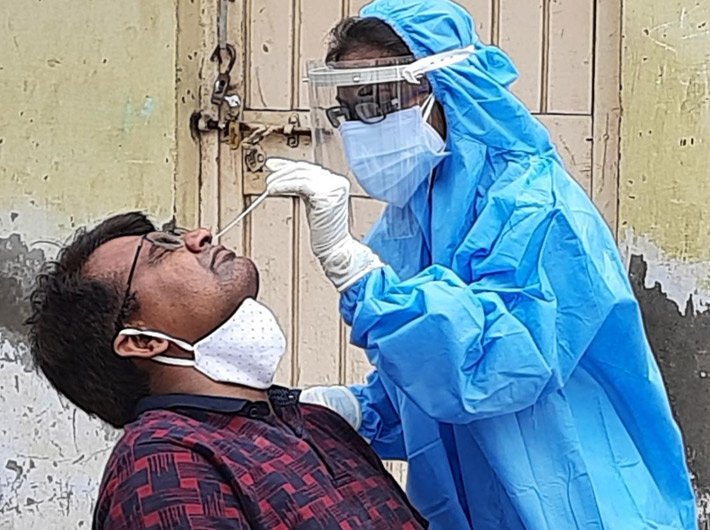With Covid-19 infections on an upward spiral in the state of Maharashtra as well as the city of Mumbai, the BrihanMumbai municipal corporation (BMC) has tightened testing rules instructing ward offices to meet daily set targets.
Setting a daily target of compulsory 47,800 Rapid Antigen Tests RAT, the civic body will mandatorily conduct random RAT at crowded places like malls, railway stations (for inbound trains), Maharashtra state road transport corporation bus depots, ‘khau gullies’, hawkers, market places, tourist places, and various government offices.
Test results will be available in 10-20 minutes. Any person testing Covid positive will be taken to BMC isolation centres. BMC will prosecute offenders who refuse to undergo the tests.
“RAT will be carried out without the consent of citizens who are present at these places. If the citizen refuses to test, it would amount to an offense under The Epidemic Act, 1897 hence action shall be initiated under the Epidemic Act, 1897 against the offender,” BMC has said in its circular on Saturday.
The civic body has set daily targets to be met by its wards. At all malls across each of the 27 wards, every day at least 400 (total 10,800) visitors will be randomly tested for RAT. At nine railway stations with inbound trains originating from or passing through the state of Delhi, Rajasthan, Gujarat, Goa, Kerala, and Vidarbha in Maharashtra at least 1,000 (total 9,000) passengers have to be randomly tested every day. Similarly, at four MSRDC bus depots (Mumbai central, Parel, Borivali, Kurla) at least 1,000 (total 4,000) passengers have to be randomly tested for RAT.
In addition to these crowded places, mandatorily 24,000 random RAT will have to be done at all restaurants (staff and customers), ‘khau gullies’, hawkers, market places, tourist places, market places, government offices , beaches, etc. in all wards.
“The costs for rapid antigen tests at malls will be borne by the concerned visitor entering the mall. Any visitor who refuses to test or refuses to pay charges for RAT will be prosecuted under the Epidemic Act, 1897. At all other crowded places, MCGM will bear the costs of rapid antigen tests and payments will be made by assistant commissioners of concerned wards to labs attached to their respective wards,” BMC has said.
BMC has given a detailed target of random and mandatory tests to be conducted at malls, railway stations, bus depots situated in all wards by assistant municipal commissioners, daily reports of which have to be submitted to AMC (WS).
In another statement, announcing the list of 59 private hospitals mandated as vaccination centres besides government and MCGM hospitals, BMC has appealed to the citizens who have successfully registered themselves on the CoWin portal to visit their nearest vaccination centre and get vaccinated without waiting for a scheduled appointment. To those who are eligible for vaccination but have not registered themselves, BMC has appealed to get themselves registered. Currently senior citizens (above 60 years of age) and those with comorbidities in the age group of 45-59 years are to be vaccinated.
Vaccination at state Covid vaccination centres and MCGM hospitals is free; at private hospitals the cost is fixed at Rs 250.
“Since there is no permanent cure for the virus yet, it is imperative for us to practise quarantine guidelines along with maintaining physical distancing, wearing masks and washing our hands frequently. Let us join hands and ensure 1 lakh vaccinations every day to make our great city Covid free,” BMC commissioner Iqbal Singh Chahal said.
The 59 private Covid vaccination centres in Mumbai include Jaslok, HN Reliance, Breach Candy, Bombay, Saifee, Global, Hinduja, Lilavati, Nanavati, Kokilaben, Fortis , Holy Family, Inlaks General, SRCC Children’s Hospital, Holy Spirit, and Shantiniketan hospital among others.



